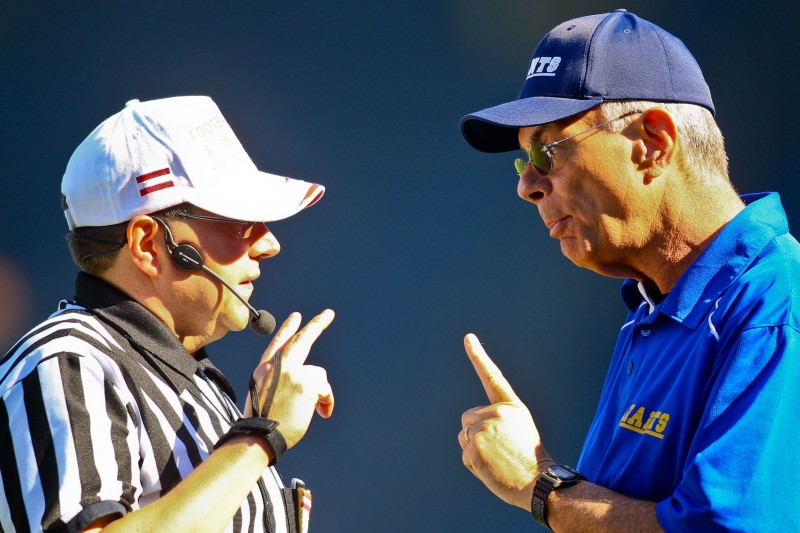
Who are you, really? What type of person are you at work? How do you carry yourself? Are you a help or a hindrance? A go-getter or a no-getter? Juice or energy vampire? Do you dress for success or just wear whatever because you’re a strength coach and you think you can?
In the realm of strength and conditioning, you are always selling yourself, whether you like it or not. Administrators, athletic directors, sport coaches, your boss, athletes, recruits, and everyone else around you — every time you meet up with someone it is an opportunity to build a bridge and have someone in your corner when things go south. As I have stated before, these are the people that are going to help you to get jobs, so you must do your best to make them happy.
Just look at it this way: If I am a coach and I come into the weight room unannounced with a recruit (one of the things that drives me crazy) and you act pissed or mad and don’t even walk over to introduce yourself because your feelings are hurt, how does that really look on you? Trust me, coaches have a million things they need to worry about, and sometimes communicating with us slips through the cracks. I get it. But don’t think for one minute that your feelings come into play. You got it done or you didn’t.
RECENT: X Marks the Spot — 3 Ways to Make It to Your Next Big Coaching Job
No matter where you are on the totem pole, as a professional you should act in a manner for the job you ultimately want and not necessarily the job you currently have. I had the pleasure of working with Lincoln Riley years ago and he was one assistant that I knew without a doubt was going to be a successful head coach someday. He carried himself like a boss from day one, not by overstepping his bounds, but by acting the way a head coach should act: as a professional in every way.
There are a lot of assistants in every sport that want to be head coaches, but how are you portraying yourself? If you want to be a head strength coach, why would you go out and act the fool on weekends, getting drunk with the younger guys on the staff, and then say, "I won’t do that when I’m the boss"? You should always hold yourself to a higher standard.
I really feel that this is what holds a lot of coaches back — the way they are perceived by their colleagues and others around them. I have seen head coaches try to help young assistants, telling them how and when to do things in certain situations to help them get the momentum moving in the head coach direction, and they decide not to do it. Then they are shocked that they are assistants for life.
Some people choose to ignore advice and others don’t know. If you don’t have a clue how to act, find some mentors or people you respect and learn from them. It does not have to be a strength coach; it could be and administrator, someone from business, you name it. It is easy enough to put a plan together, you just need to follow through to be successful. The process of becoming the coach you want to become should never end. The most important person you are selling yourself to every day should be your boss. That should be your priority every single day. Do not get comfortable just because you might have been his friend, worked with him before, or have been with him a long time. The only thing your boss cares about is what you have done for him lately. He doesn't care that you did a great job two weeks ago running a station. What have you done today to impress him? That's what he wants to know. Remember, he is selling himself and his program every day to the same people you are, and you have to make him look good so the whole staff will shine. This applies if you are an intern, GA, assistant, or any one of the thousand titles that are out there now for strength coaches.
There is nothing worse than a weak link on a staff. I have fired people for what they think may have been a stupid reason, but it was my reason and that is all that counts. As a head strength coach you have to protect (and sell) your program every day, and the head guys I know will be dammed before they willingly let a terrorist come in and screw up what it has taken them years to build. I know that all you guys know everything and have all the answers, because somewhere on the internet your opinions and thoughts are right. I know that you have personally trained athlete x for the combine and someone said you did a good job, but none of those things will qualify you as a head guy.
MORE: Expectations and Group Culture — A Conversation for Day One
I’m even going to throw some old school knowledge your way: what the boss says goes. You can hate it, but don’t be that guy to talk behind his back or bitch and complain in the corner. Be a man, talk to him one-on-one about what you think, and move on. You said your piece, now roll up your sleeves and go to work or leave. Your choice.
Someone told me a long time ago that you never know until you sit in the boss’s chair. I learned it firsthand on my way up, and hopefully you can learn from what I am telling you now. I saw some things done by my boss when I was an assistant that had me scratching my head, but I never brought it up to my boss and asked why he did what he did. Then when I became a head guy, some of those same situations came up that I was scratching my head at and I realized why he did what he did — and I did the same thing! Working under him, I learned things that I would use as a head guy, and some things I would not use as a head guy, but in both cases I just kept learning and worked my ass off for him. Live and learn.
There is also something else you have to realize, and I learned it the hard way. What works in one place may not work at another. It happens like this: At on place you may have done a great job selling yourself and your boss helped you get a job at a better school with more pay and more prestige. You two had really had good communication and you did things the way you were supposed to implementing his program. Now you are at the new place doing the same things the same way that got you there, and it is not working. You seem to be clashing and things just don’t feel the same. Guess what? They aren’t the same.
Even if the whole staff came over, there are always different parameters at different programs — different athletes, different administrators, and different coaches. This is when you have to start all over again, find your niche, and start selling yourself all over again. Trust me, I have tried to do the same things at another school that I did at a previous place where I had great success. I even brought some of the same assistants and workouts. And I still fell flat on my face. It was a different situation, and I had to start from scratch and start the whole thing over.
So learn from my mistakes. Get out there, sell yourself and the program you are working for, and great things will happen. Improvise, adapt, overcome.
Photo courtesy of Herbert Kratky © 123rf.com












1 Comment